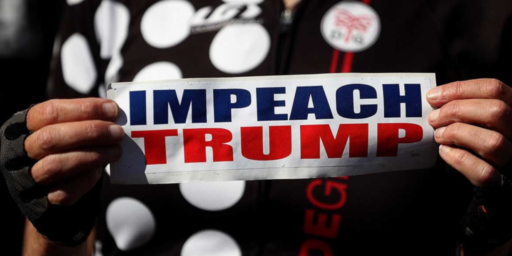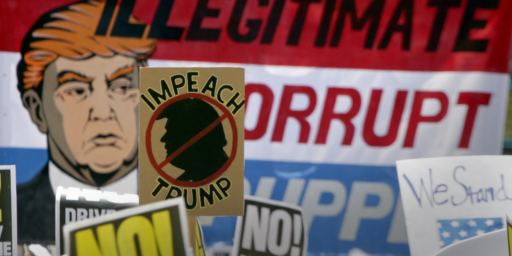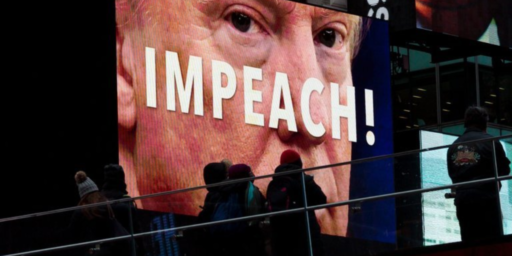Impeachment in a System of Checks and Balances
What should be the bar? Can it ever be reached?

Keith Whittington, the William Nelson Cromwell Professor of Politics at Princeton University, has a post at The Volokh Conspiracy titled “Revisiting the First Trump Impeachment,” which is itself a preview of his contribution to a symposium at the Missouri Law Review. The abstract:
Measured by any yardstick, it is hard to think that the first impeachment of President Donald Trump was particularly successful. But there are important broader questions raised particularly by the first Trump impeachment that have significance for how we think about the impeachment power moving forward. If future impeachment efforts are to be more successful, or even useful, Congress will have to understand the nature of the constitutional task that it is undertaking.
As the House contemplates making use of the impeachment power and the Senate contemplates whether to convict an officer in an impeachment trial, there are some basic questions that must be asked in any impeachment episode. What is an impeachable offense? Is this kind of behavior impeachable? Does this instance of misconduct justify impeachment? It should not have been hard for the House to answer the first two questions in regard to the first Trump impeachment. The third question was the more challenging to answer, and the House struggled to answer it.
This essay argues that abusing the powers of the presidency for the sake of purely personal interests is well within the traditional scope of the impeachment power. In order to assess whether an officer has abused power in that way, members of Congress must take care to deliberate across the political aisle so as to identify and resolve possible good-faith explanations for an officer’s behavior. A House that does not bother to curb its own partisan instincts risks abusing its own constitutional authority by rushing headlong into an impeachment that does not meet the constitutional standard of high crimes and misdemeanors. Even after the House and the Senate have come to an understanding of the scope of impeachable offenses and each has satisfied itself that an officer has committed deeds that fall within that scope, they must still decide whether an impeachment and a conviction and removal is warranted. Those decisions are necessarily political judgments about what risks the country faces and how they are best navigated. If Congress is to contemplate pursuing an impeachment, it should have a clear view of what it is trying to accomplish and why impeachment is the best path to getting there.
The article itself, which is currently not paywalled, is in PDF form and thus rather hard to excerpt here.
On the question, “What is an impeachable offense?” Whittington correctly notes that the “Constitution creates a broad standard rather than a precise rule” and that, from the beginning, the House has impeached officials for transgressions that are not chargeable as crimes and that, indeed, that had long been the practice under the English Common Law.
As to “Is this kind of behavior impeachable,” Whittington rightly notes that both the Common Law precedent and the Framers held that officials should not be impeached over policy disagreements or “mere mistake, inadvertance or misjudgment.” But he argues that Trump’s attempt to leverage military assistance for a friendly nation for dirt on his political enemies was indeed a “corrupt purpose” worthy of impeachment. Ditto the second article, Trump’s obstruction of Congress for refusing to cooperate in the discovery process during the pre-impeachment hearings, which correctly sought to preserve legislative prerogative.
Where Whittington and I differ is with respect to his handling of the third question, “Does this instance of misconduct justify impeachment?” While seemingly a slightly rephrased version of the second question, he means something more fundamental: “whether the offenses rise to the level that wouldjustify conviction and removal of the officer.”
We agree that “impeachments are matters of constitutional politics, not legalities.” And that, therefore, “the audience for these arguments is ultimately political.”
I’m less comfortable with but ultimately agree with Whittington’s stance that, because “the impeachment power is the heaviest artillery in the congressional arsenal and should not be used if other, less dramatic remedies are available and can get the job done.” Ditto the corollary that, “The president and his defenders must persuade the members of the House and Senate, and beyond them the American people, that no unforgivable sins have been committed. That is not primarily a lawyerly task but a political one.”
I depart, though, on this:
Conviction on articles of impeachment and removal from office require the support of two-thirds of the Senate, which meant persuading a significant number of Republicans. If removing the president from officeis the best remedy to the country’s perceived troubles, then the House might be obliged to press forward—if there is a realistic chance of conviction. But if Republican voters remained firmly in Trump’s corner and Republican senators remained unwilling to buck their constituents, then rushing ahead with an impeachment could be counterproductive.
This was, if I recall correctly, the position of my friend and occasional OTB contributor Butch Bracknell, a lawyer and longtime Democrat. He was therefore on opposite sides from me on the Bill Clinton impeachment and presumably carried those scars with him.
My problem with this stance is that it essentially means no President should ever be impeached unless he’s very unpopular. As every OTB reader likely knows, the House has only impeached three Presidents in the history of the Republic: Andrew Johnson, Clinton, and Trump—the latter twice. None have been convicted and removed by the Senate. Additionally, neither Johnson nor Clinton had a single Senator of their own party vote to convict. Trump broke that logjam, with Mitt Romney voting to convict him of a single charge in the first impeachment and seven Republicans, including Romney, Richard Burr (NC), Bill Cassidy (LA), Susan Collins (ME), Lisa Murkowski (AK), Ben Sasse (NE), and Pat Toomeny (PA). Still, that was seventeen votes shy of the needed total.
Whittington’s focus here, though, is squarely on the first impeachment. And, while I disagree with him, I see his point:
In the case of a president, an alternative remedy to presidential misbehavior is always an electoral one. If the president poses an imminent threat to the country because of his ongoing abuse of power, then waiting for the election cycle to play out would be reckless. If, however, the president’s apparent misconduct is in the past, containable or of lesser consequence, then exposing problems for voters to see and leaving the final judgment to the American people becomes a viable option, and in some circumstances the most responsible option.
This was Bracknell’s position and it’s certainly defensible. If the public isn’t so offended by the malfeasance as to rise up and overwhelmingly demand the President’s ousting, then maybe the bar for removal—which is effectively an overturning of the previous election—has not been met.
Then there’s the second-order effect: If you come at the king, you best not miss. Trump was rather clearly emboldened by the failure of impeachment to oust him and was able to leverage it with supporters to portray the Democrats as hacks out to get him. Then again, he did in fact lose his re-election bid.
Whittington is not an absolutist, either:
Even if conviction and removal are effectively off the table, there might still be reasons to impeach. Impeachment can serve other purposes. It can serve as a tool for shoring up, or changing, the acceptednorms of political behavior. Impeachment can be a rebuke to the officeholder and a warning to his successors. If violating norms appears to be a path to political success, the theory goes, established norms will eventually crumble. Impeachment is a tool to impose political costs on norm violators and discourage others from emulating them. If President Trump’s actions were properly within the scope of the impeachment power, then the House could reasonably decide using the impeachment process to condemn the President’s actions could be productive even if the President could not be removed.
This is the close of the body of the essay; with only a wrap-up following. He offers no comment as to whether this purpose was achieved with regard to the first impeachment. Given that it seems to have been more-or-less forgotten by the voters, I would say No. I would, however, say that the second impeachment—for his actions leading up to, during, and after the Capitol Riots—did.
Regardless, it seems that the impeachment power is all but useless against a sitting President, in that this co-partisans in the Senate are highly unlikely to go along with removing him from office. We couldn’t get the requisite number of Republicans to go along even after he incited an angry mob to storm their offices, putting their very lives in danger.
The only time in American history where it would likely have worked was in the wake of the Watergate scandal. While Richard Nixon’s co-partisans mostly stood by him for months as damning information steadily dripped in, it was pretty clear that the release of the tapes would be a smoking gun. He would almost certainly have been impeached and removed had he not instead resigned. And, to Whittington’s point, the public backed his ouster. By the end, his approval ratings had fallen to 28 percent and a whopping 57 percent of the public supported his removal.
But that was nearly half a century ago and a very different political climate. The two parties were much, much less sorted than they are now, with Democrats still the dominant party in the South and Republicans dominating in California and New England. I’m not at all sure that a Watergate scandal would be enough to galvanize outrate at this point. Indeed, I would argue that Trump’s attempts to steal the 2020 election far exceeded any of Nixon’s transgressions.






It’s pretty clear at this point that no president will ever be both impeached and convicted. Impeachment, therefore, is revealed as a poor substitute for a proper parliamentary “no confidence”/”call-for-new-elections” process by which the executive is continuously held accountable to the people.
Given the U.S. preference for corporate/landowner power, this approach is likely by design, despite our rhetoric.
@Tony W: Corporations as we now know them barely existed in 1787 and I can’t imagine it even occurred to the Framers that anyone other than a wealthy landowner would sit in Congress, much less be President. No, the problem was a failure to anticipate the rise of a party system.
@James Joyner:
Given that, despite some pretty incompetent and corrupt presidents, prior to Johnson, the fact that Johnson was the first is evidence that impeachment wasn’t the tool that the founders believed it to be. The development of parties has added to its ineffectiveness.
Partisanship has also reduced the effectiveness of elections to remove failed executives.
@James Joyner: We have had dozens of constitutional amendments, including a few that have materially changed how we elect congress and the president – but in doing so, we have not destroyed the power structures that have maintained this problem.
That’s why I say it’s intentional/by design.
And Article 4 of the 25th Amendment has proven equally useless, also because of strong partisanship, but with a stronger element of “If you strike at the king …”.
Another problem is the OLC opinion that a sitting prez can’t be indicted. TFG has amply demonstrated that the reasoning behind that opinion was stupid. However, even were that opinion rescinded, or successfully challenged in court, an AG is not going to zealously pursue the prez who appointed him.
We’re screwed.
When I started reading Whittington’s sentence,
I was afraid he was going to say “well within the traditional scope of presidential behavior.” Which one could argue, although few have been as blatant as TFG was.
Most of the way through this post I was asking “Where’d Nixon go?” That Nixon avoided almost certain conviction only by resigning is a strong argument that the problem is not structural, but our current extreme partisanship. For further evidence, I’d point you to comments on this piece at Volokh. Most are to the effect that the solicitation of a bribe we see in the testimony didn’t really happen, Trump just wanted a high minded crusade to stamp out corruption in Ukraine. And Hunter Biden. James’ beliefs aside, no Democratic president has ever been impeached for a clearly impeachable offense, and certainly not with the surrounding cloud of other offenses offered by Nixon and Trump. And Ken Starr’s partisan motivations were way more obvious than even Durham’s. I’m not at all sure in circumstances similar to TFG’s that Ds wouldn’t vote to convict a D. That experiment has never been run.
Whittington is, IMHO, correct that the first impeachment (also the second) served little purpose, except to harden attitudes. I would point out that it looked to me like Pelosi was notably reluctant to impeach, for reasons that seem obvious. She did so only because Vindman handed the House a case they couldn’t ignore, even though they knew conviction was near impossible.
Nixon’s approval AMONG REPUBLICANS had dropped to about 50%, Trump was still around 80. This is the metric that mattered to GOP senators, not overall approval. It really is the extreme partisanship.
Trump’s behavior was a direct affront to House prerogative. The House, where appropriations originate appropriated money, which Trump held back in an attempt to use for political gain. And then the House requested documents as part of discovery, and Trump blew them off. These are direct affronts, not just general misbehavior. This is the point that Whittington or at least your precis of him seems to be missing.
@James Joyner:
Corporations at the time were very different, but they did exist. They tended to wield far more political power than they do today (albeit outside their home countries). I mean things like the British East India Company. They ruled India for a very long time. As I recall, it was chartered around 1600.
Not to mention that corporations like the Virginia Company, Hudson Bay Company and others, had a hand in colonizing North America.
@James Joyner:
This is one of those common myths that keeps getting repeated even though it’s not true. At the time the Constitution was signed, political parties already existed in the UK parliament for over a century. Treating it as a completely unforeseeable future rather than a perfectly foreseeable present that the founders thought they could ignore because they thought they knew more about politics then they actually did is part of the “Constitutional inerrancy” dogma Republicans use to resist attempts at political reform.
@James Joyner:
“Once again, Freddie, you have inadvertently stumbled upon the truth.” Moreover, the Framers probably didn’t intend that anyone other than a wealthy landowner would ever sit in Congress much less become President. It’s never been clear to me that they intended citizens, at large, to vote at all.
How this relates to impeachment? Essentially, the impeachment clause is a statement by the founders “Not to worry, ‘we the people,’ we in government will monitor our own conduct and handle discipline in house. All you have to handle is the voting into office part (and probably very few of you even for that); we’ll take care of what to do about ‘bad actors’.” And as a plan, that’s not inherently a bad one. “We” probably can take care of this issue pretty well. Even as parties become a factor (although if people want to make political parties a bogeyman, I got no dog in the fight).
The significant change that has happened, is that as more marginally qualified people have been given the franchise and our society has become mindbogglingly more wealthy than in the past, the identify of “We” (as in the drivers and occupants of the clown car) has changed dramatically. Founders, looking at our current system, would probably say “WTF!!! How did all y’all ever imagine that letting Cracker (among many, many, many others–millions even) vote was a good idea? WHAT WERE YOU THINKING?” They might well also ask about how the system they designed got so warped as to have Representatives Boebert, and MGT, and Senator Tuberville. (In fealty to bothsiderness, they would probably look askance at AOC, and Jayapal, too. And please feel free to add any other names as my antifeminist bias is probably showing fairly strongly, but I don’t really follow the inside baseball part well enough to pick out lower profile whack jobs. 🙁 ) Some of the problem is parties, but the bigger factor to my view is that too many parochially minded (in the closeminded but not necessarily Catholic sense) single issue voters who don’t give a rat’s ass about what the nation needs as opposed to what they want are casting their votes hoping to pwn someone or another.
To paraphrase Von Clausewitz (I think), the US has stopped being a great nation because people always get the government they deserve.
@Just nutha ignint cracker: I stopped in mid rant and forgot to circle back to how this all factors into impeachment. Impeachment is no longer a workable check in our political system. The “we” that the authors of impeachment imagined no longer exists. We, whoever the fwk that is, will probably never again be unified enough to even recognize bad actors and bad behavior by our leaders.
The Framers might not have known what a political party was, but they certainly knew the word “faction”, which is what political parties were called before they got business cards and letterhead. The idea that the presidency or governorship might be captured by a particular faction was one possible problem they chewed over.
No, I think the real problem is that we have elevated the position of president to that of some kind of God-Emperor, loyalty to whom must be mindless and constant, and who must never face criticism or censure because someone the nation will be weaker and we might get invaded or nuked or something. The strident hysteria that passes for GOP party loyalty makes impeachment of a GOP president impossible, and the casual way they threaten impeachment of Dem presidents shows they don’t take the concept seriously at all.
We’re screwed.
@Not the IT Dept.: I have read that even the word “president” was designed to sound like a much lower-status executive. They were very wary of creating a “king” type of figurehead, and wanted the executive to be very administrative in focus.
Beyond Roosevelt’s “Bully Pulpit” framing of the advantage a president has in centralized communication, Congress, time and again, has willingly ceded its power to the executive – the War Powers act of 1973 comes to mind as a recent example, but there are many others – and this has centralized power too much in the White House.
American mythology distrusts centralized power as a concept, but at least some of us seem to like a strongman-style figurehead – as long as that strongman is wearing the same jersey color as we are.